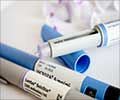Conservative regimen of continuous insulin therapy in patients undergoing certain types of non-cardiac surgery could help prevent heart attacks and other cardiovascular problems.
A study published in the May 2009 issue of the journal Anesthesiology has found that a more conservative regimen of continuous insulin therapy in patients undergoing certain types of non-cardiac surgery could help prevent heart attacks and other cardiovascular problems.
Aggressive insulin therapy aims for blood glucose levels of 80-120 mg/dL. This aggressive blood glucose control has been extensively studied before in cardiac surgical and intensive care patients.However, the study by Balachundhar Subramaniam, M.B.B.S., M.D., and his colleagues from Beth Israel Deaconess Medical Center offers fresh insights into less aggressive insulin therapy for other types of surgical patients.
"Our results provide the first evidence to demonstrate that continuous infusion of insulin - targeting a blood glucose concentration of 100-150 mg/dL - decreases major cardiovascular events in patients undergoing vascular surgery," said Dr. Subramaniam.
For many years, conventional glucose management aimed for a blood glucose level of less than 150 mg/dL by using intermittent intravenous bolus injections of insulin. For Dr. Subramaniam's non-intensive care vascular surgical patients, the conservative continuous infusion aiming for a blood glucose concentration of 100-150 mg/dL turned out to be significantly more beneficial than conventional blood glucose therapy.
According to Dr. Subramaniam, the variability of blood glucose concentrations in patients may play a role in producing adverse outcomes after surgery. Previous studies have shown that fluctuations in blood glucose levels are a stronger predictor of mortality in certain patient populations than absolute blood glucose values.
"Continuous intravenous administration of insulin is likely to be associated with less variability of blood glucose concentrations compared with either intermittent bolus subcutaneous or intravenous insulin administration," said Dr. Subramaniam.
Advertisement
Anesthesiologists: Physicians providing the lifeline of modern medicine. Founded in 1905, the American Society of Anesthesiologists is an educational, research and scientific association with 43,000 members organized to raise and maintain the standards of the medical practice of anesthesiology and improve the care of the patient.
Advertisement
SRM















